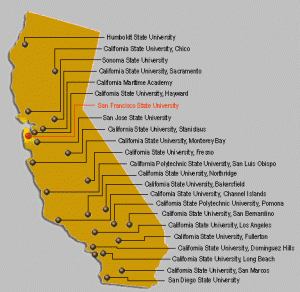Interim Cal State Chair: ‘Herb Carter Was the Fall Guy’
By JOHN HRABE
Legislators don’t have Herbert Carter to kick around anymore. But, don’t expect Cal State’s spendthrift administrators to interpret the removal Tuesday of Carter as the chairman of the Board of Trustees as a sign they need to clean up their act.
“Herb Carter was basically the fall guy,” Bob Linscheid, the interim chairman of the Cal State Board of Trustees, told the Chico Enterprise-Record. “To basically push him off to the side is real unfortunate and is hard to explain.”
Carter’s downfall isn’t so hard to explain, if you aren’t a member of Cal State’s bureaucratic elite. Under his tenure, the board approved outrageous salaries for top administrators, while cutting faculty pay and raising student fees. In 2004, Carter’s first year on the board, tuition was an affordable $2,334 per year. This fall, incoming freshmen will fork over just under $6,000. The fiscal mismanagement culminated last July, when the board approved a new $400,000 annual base salary for the new president of San Diego State University, Elliot Hirshman, while simultaneously approving a new round of tuition hikes.
Carter’s removal doesn’t end the need for substantive reforms at CSU. CalWatchDog.com has previously reported on the uncanny similarities between the ongoing pay scandal and a scandal 22 years ago. In 1990, then-Chancellor Ann Reynolds was forced to resign after handing out pay raises and lavish perks to top administrators. Carter, then Cal State’s executive vice chancellor, was among the privileged group that received both a 26 percent raise and a new taxpayer-funded vehicle.
Back then, the Orange County Register editorial board cautioned that one bureaucrat’s removal didn’t solve the Cal State’s systemic problems. “Ms. Reynolds is leaving, but the Legislature shouldn’t use her exit as an excuse to allow business as usual at CSU.” This time around, two State senators are vowing to keep the pressure on Cal State. Sen. Joel Anderson, R-Santee, recently told CalWatchDog.com that he isn’t about to let Carter become the scapegoat for other Trustees.
“Students, parents and taxpayers don’t need a Ph.D. to know they are being paid lip service by CSU trustees,” Sen. Anderson said. “We will continue to insist the best from higher education and demand Trustees who fall short be removed. With an average compensation package of $372,000 for university Presidents, more than double the governor’s pay, there are no more acceptable excuses.”
Relevant Republican
At a time when some are saying Republican legislators are “irrelevant,” Anderson proves them wrong. He was the first senator to publicly oppose Carter’s reconfirmation, a move that was quickly followed by Senate Republican Leader Bob Huff, R-Diamond Bar. A strong stand by a united Senate Republican Caucus forced Senate President Pro Tem Darrell Steinberg, D-Sacramento, to abandon altogether a floor vote on Carter’s confirmation.
Steinberg also faced dissent within his Democratic caucus. The Los Angeles Times reported that Sen. Leland Yee, D-San Francisco, was among those undecided about Carter’s reconfirmation. Yee told CalWatchDog.com that he remains committed to bringing accountability to higher education, regardless of who is at the Cal State helm.
“While Mr. Carter will not be returning to the Board of Trustees, we must do more to change the culture of CSU,” said Yee. “We must pass real reforms, like SB 967 and SB 1515, to finally stop executive pay and student fee hikes.”
Reform Measures
Yee’s two measures would drastically shake up the Cal State board. SB 967 would impose a hard cap on incoming executive officers of no more than a 5 percent increase.
SB 967 would be a substantial improvement over CSU’s current executive compensation, which was approved by Trustees in January. Under that policy, the carefully worded cap allowed the board to provide a 10 percent salary boost as well as continue the controversial policy of supplementing executive pay through university foundations. CSU Chancellor Charles Reed, San Jose State’s Mohammad H. Qayoum, San Diego State’s Elliot Hirshman and Cal Poly San Luis Obispo’s Jeffrey Armstrong currently receive foundation bonuses ranging from $25,000 to $50,000 per year.
SB 1515, the more controversial of Yee’s proposals, would decrease the number of gubernatorial appointees to the board and increase the number of student and employee representatives. While the bill empowers employees with a vested interest in the system, there are some indications that the changes might be good for taxpayers.
Administration vs. Faculty and Students
Cal State’s administration is engaged in open warfare with students and faculty. Last month, the California Faculty Association board scheduled a strike vote for this April, the second such action in the past four months. Yee’s bill has the potential to give a bigger platform to CSU faculty members that have been critical of the wasteful administration. In fact, the CFA has been one of the most vocal opponents of the high executive salaries.
“Working for the university is about performing public service, not becoming a CEO in private industry,” CFA President Lillian Taiz, a professor of history at CSU Los Angeles, fired off in a recent press release. “Furthermore, it is simply repugnant to hear the chancellor cry poor about well-to-do executives having to sell a home at a loss and seeing their pensions capped at a mere $240,000 per year while tens of thousands of students are losing their opportunity to climb into the middle class.”
Yet, somehow Linscheid and the rest of Cal State’s top brass believe the Cal State’s problems are the Legislature’s fault. “The ones to blame for high tuition are the legislators themselves,” the Chico Enterprise-Record reported of Linscheid. “They’ve turned their backs on the students.”
Related Articles
Bill to end high school exit exam advances
Gov. Jerry Brown and state schools chief Tom Torlakson have made plain for years they want no part of the
West Covina's Great Ed Reform
Steven Greenhut: Per the San Gabriel Valley Tribune: “WEST COVINA – Board members supportive of a new district policy are
Will School Block Grants Replace Earmarks?
MAY 3, 2011 By WAYNE LUSVARDI In a February report, the Legislative Analyst’s Office charged that “virtually every aspect of K-14




